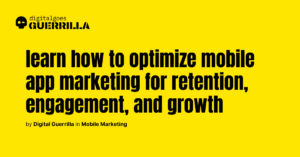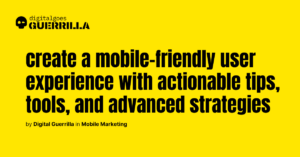In today’s fast-paced digital world, mobile marketing has become a cornerstone of successful customer engagement strategies. But as competition intensifies, simply optimizing for mobile isn’t enough—you need to bring intelligence and personalization to the forefront. Enter Artificial Intelligence (AI): the game-changing technology reshaping how marketers interact with mobile users.
In this blog post, we’ll explore advanced strategies for leveraging AI in mobile marketing. Beyond the basics, you’ll discover nuanced insights, actionable tips, and real-world examples to elevate your campaigns. Whether you’re a marketer looking to refine your tactics or a business owner aiming to connect better with customers, this guide will provide the tools and knowledge to stand out.
Why AI is a Game-Changer in Mobile Marketing
Mobile marketing isn’t just about reaching people on their phones—it’s about creating meaningful, personalized experiences at scale. AI enables marketers to analyze vast amounts of data, predict customer behaviors, and deliver hyper-targeted campaigns that resonate.
For example, AI can process millions of data points from user interactions on apps, websites, and social media to predict which type of notification will get a click or what time of day a user is most likely to open an email. It’s about turning raw data into actionable insights to create deeper connections with your audience.
The AI-Powered Mobile Marketing Toolbox
AI isn’t a single tool—it’s a suite of technologies that can be applied to various aspects of mobile marketing. Here’s a breakdown of key areas where AI can make an impact:
1. Personalized Mobile Experiences
AI allows for unprecedented levels of personalization. By analyzing user behavior, preferences, and historical data, AI algorithms can create tailored experiences.
- Example: An e-commerce app could recommend products based on browsing history and even predict what a user might need next (like sunscreen in summer).
2. AI-Driven Chatbots for Instant Customer Engagement
Chatbots are no longer clunky or robotic; modern AI-powered chatbots can understand context and sentiment, offering real-time, human-like interactions.
- Use Case: Brands like Sephora use AI chatbots to provide beauty recommendations, boosting customer satisfaction while reducing response time.
3. Predictive Analytics for Smarter Campaigns
Predictive analytics uses AI to analyze past behavior and forecast future actions. This allows marketers to proactively address customer needs and preferences.
- Example: A fitness app could send reminders based on a user’s activity patterns, encouraging them to stay consistent with their goals.
Emerging Trends: Advanced AI Applications in Mobile Marketing
1. Voice Search Optimization
With mobile voice search gaining popularity, optimizing for voice queries is critical. AI helps identify conversational long-tail keywords and adapt your content to match natural speech patterns.
- Actionable Tip: Focus on optimizing for question-based phrases like “Where can I find affordable yoga classes near me?”
2. Augmented Reality (AR) Integration
AI-powered AR is transforming mobile marketing by creating immersive experiences.
- Example: IKEA’s Place app uses AI and AR to let users visualize furniture in their homes, reducing the decision-making barrier.
3. Sentiment Analysis for Better Messaging
AI can analyze customer sentiment through reviews, social media, and emails to inform your messaging strategy.
- Case Study: A fashion retailer might adjust its promotional tone during peak seasons based on positive sentiment trends in online chatter.
AI in Mobile Marketing: Best Practices for Success
To harness AI’s full potential in mobile marketing, follow these best practices:
- Start Small and Scale: Begin with one AI application—like predictive analytics—and expand as you gain insights.
- Invest in Quality Data: AI is only as good as the data it learns from. Ensure your data is accurate, clean, and relevant.
- Test and Iterate: Continuously monitor campaign performance, tweak algorithms, and refine strategies based on results.
- Combine AI with Human Creativity: While AI excels in data analysis, human marketers bring creativity and emotional intelligence to the mix.
Tools to Supercharge Your AI-Powered Mobile Marketing
Recommended Platforms:
- AI Analytics Tools: Google Analytics 4 (with predictive capabilities)
- Chatbot Builders: MobileMonkey, Tars
- AR Platforms: Blippar, Vuforia
Pro Tip: Look for platforms offering integration with your existing marketing stack to maximize efficiency.
FAQs About Using AI in Mobile Marketing
Q1: Is AI suitable for small businesses in mobile marketing?
Absolutely! Many AI tools are affordable and scalable, making them accessible for businesses of all sizes.
Q2: How can I measure the success of AI-driven campaigns?
Use metrics like engagement rates, conversion rates, and customer retention to gauge effectiveness. AI analytics tools can provide in-depth insights.
Q3: What are the challenges of implementing AI in mobile marketing?
Common challenges include data privacy concerns, the need for quality data, and the initial investment in tools or expertise.
Key Takeaways
AI has the power to revolutionize mobile marketing, enabling hyper-personalized experiences, smarter campaigns, and deeper customer engagement. By adopting AI technologies, optimizing for voice search, leveraging AR, and using predictive analytics, businesses can stay ahead in the competitive mobile landscape.
Ready to take your mobile marketing strategy to the next level? Start exploring AI tools today and watch your campaigns transform.


